
“For God knows that in the day you eat of it, you will be like God, knowing good and evil.”—Genesis 3:5
“But he who sins against me injures himself, all those who hate me love death.”—Proverbs 8:36
Birth of Philosopher Friedrich Nietzsche,
October 15, 1844
There is an old joke that goes something like this:
“God is dead.”—Friedrich Nietzsche
ZAP
“Nietzsche is dead.”—God
 ccording to Christian historian Paul Johnson, the ideas of four men shaped the intellectual world of the 20th, and now 21st, centuries: Nietzsche, Marx, Darwin, and Freud. Two were German Jews, one a Protestant pastor’s son, and the fourth studied for the Anglican ministry. They were born in 1844, 1818, 1809, and 1856 respectively. They influenced the world in a variety of disciplines. Nietzsche’s works spanned philosophical polemics, poetry, cultural criticism, and fiction. His ideas dramatically affected religion, philology, music, art, tragedy, and science. ccording to Christian historian Paul Johnson, the ideas of four men shaped the intellectual world of the 20th, and now 21st, centuries: Nietzsche, Marx, Darwin, and Freud. Two were German Jews, one a Protestant pastor’s son, and the fourth studied for the Anglican ministry. They were born in 1844, 1818, 1809, and 1856 respectively. They influenced the world in a variety of disciplines. Nietzsche’s works spanned philosophical polemics, poetry, cultural criticism, and fiction. His ideas dramatically affected religion, philology, music, art, tragedy, and science.
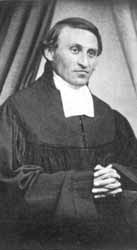
Carl Ludwig Nietzsche (1813-1849), father of Friedrich
|
|
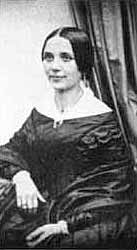
Franziska Nietzsche (1826–1897), mother of Friedrich
|
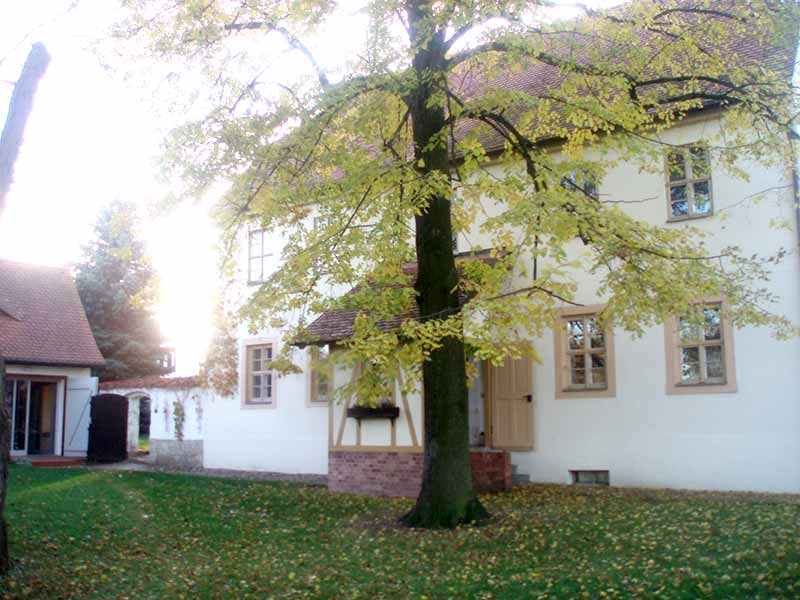
Nietzsche’s birthplace in the German town of Röcken
|
Born October 15, 1844, Friedrich Nietzsche grew up near Leipzig in Saxony, not far from Martin Luther’s hometown, a forty-two minute drive today. His father was a Lutheran pastor who named his son after the King of Prussia and died when Friedrich was five years old. He was educated in private schools, excelling in Christian theology. In high school he learned Greek, Latin, Hebrew and French and wrote poetry and composed music. After graduation from school, Nietzsche attended Bonn University, hoping to follow in his father’s footsteps as a minister. In his first semester, the Prussian college boy turned his back on the faith, dropped divinity studies, and wrote an essay declaring that history discredited the central tenets of Christianity.
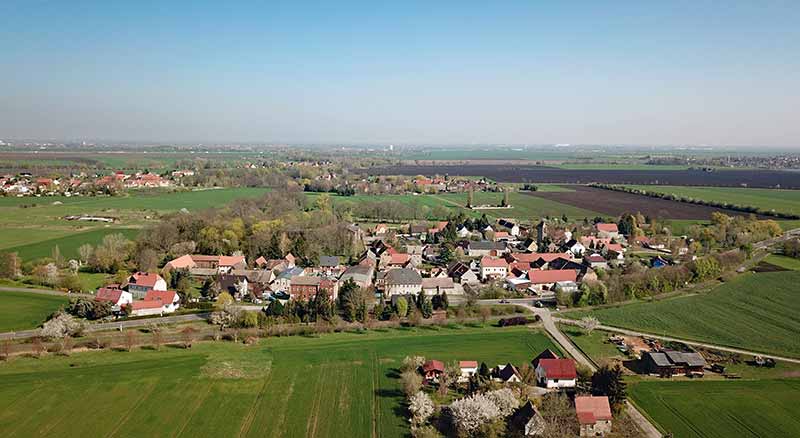
The town of Röcken, Lützen, Saxony-Anhalt, Germany—birthplace of Friedrich Nietzsche
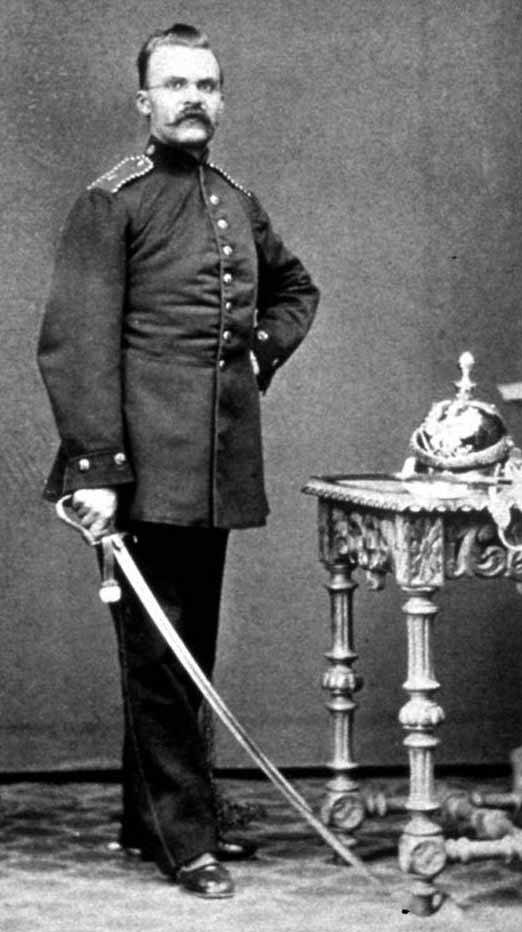
Nietzsche in Prussian uniform, 1868
|
Adopting the higher criticism and infidelity of the theologians/philosophers Feuerbach and Schopenhauer, and the “scientific” ideas of Darwin, young Nietzsche learned philosophy and philology, as well as mastered classical Greek thought. In 1869 he became Professor of Classical Philology at the University of Basel and was that same year awarded an honorary doctorate. He served in the Franco-Prussian war in which he contracted diphtheria, dysentery, and the syphilis that would eventually drive him mad and likely contribute to his death in 1900. Coupled with childhood health problems that persisted, Nietzsche was pensioned for disability in 1879. His most influential books and essays poured out of him over the following decade. His influence over European and American intellectuals would henceforth help provide the philosophical framework for the two 20th Century World Wars and the dissolution of Christian cultural hegemony until this very day.
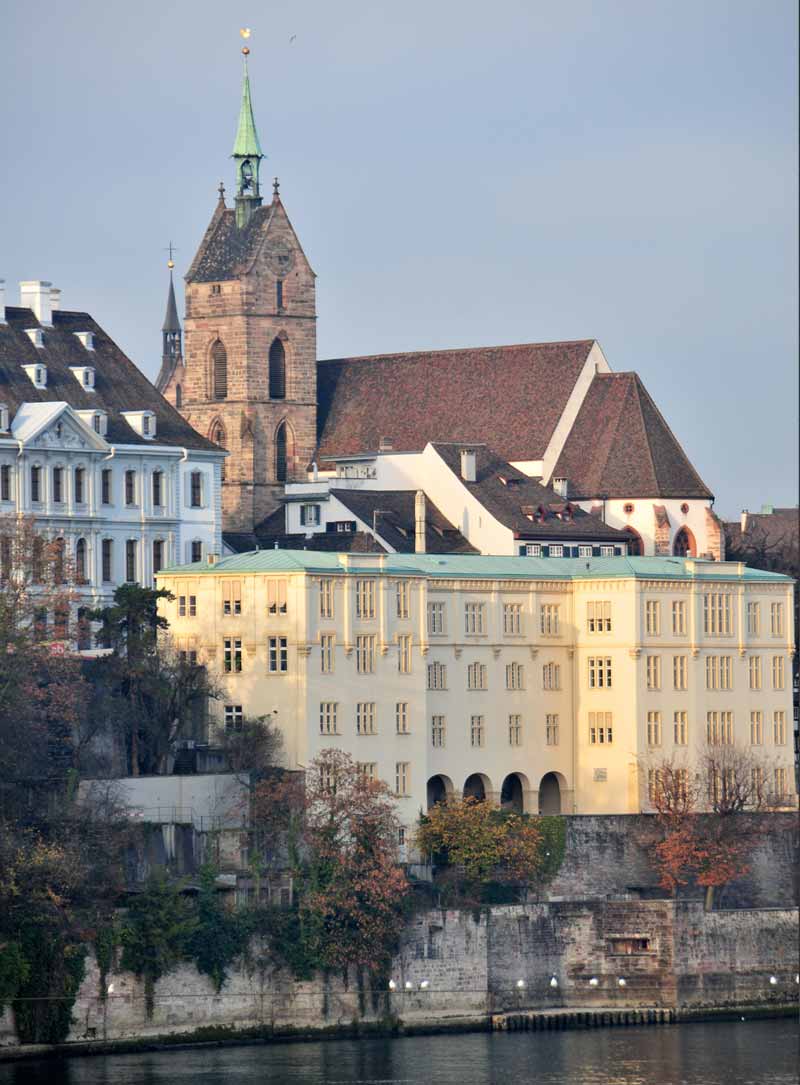
University of Basel, Switzerland, where Nietzsche was Professor of Classical Philology
|
|
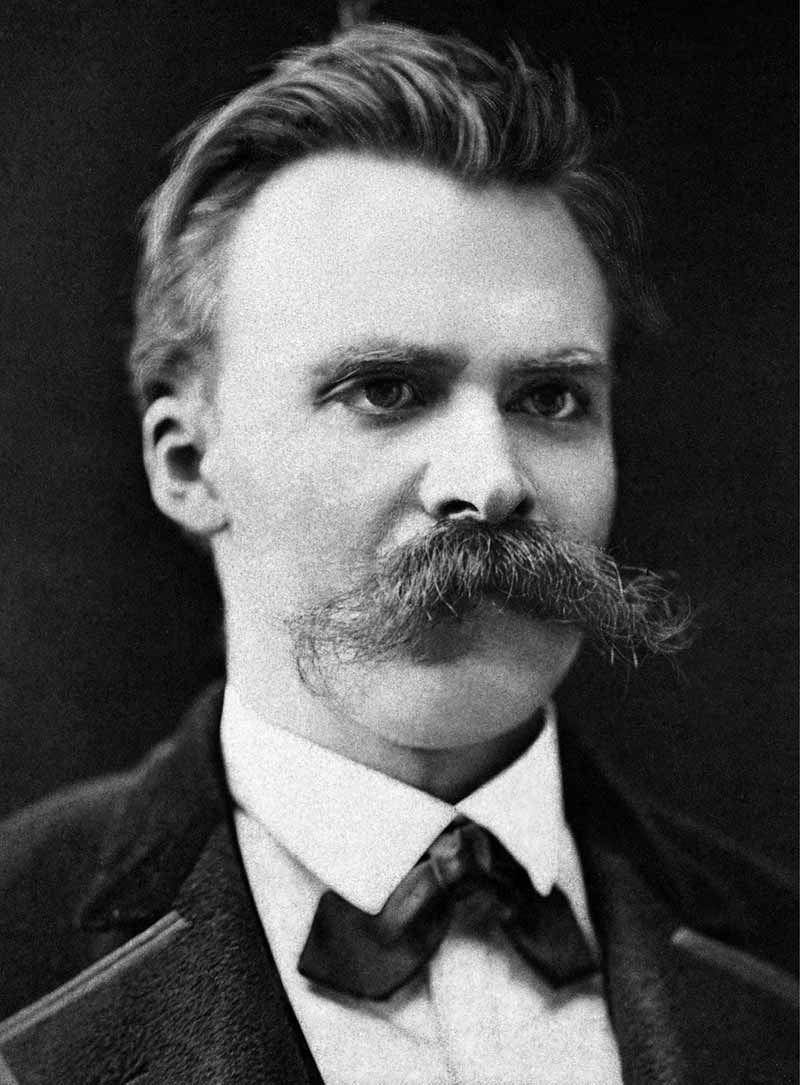
Nietzsche in 1875 in Basel
|
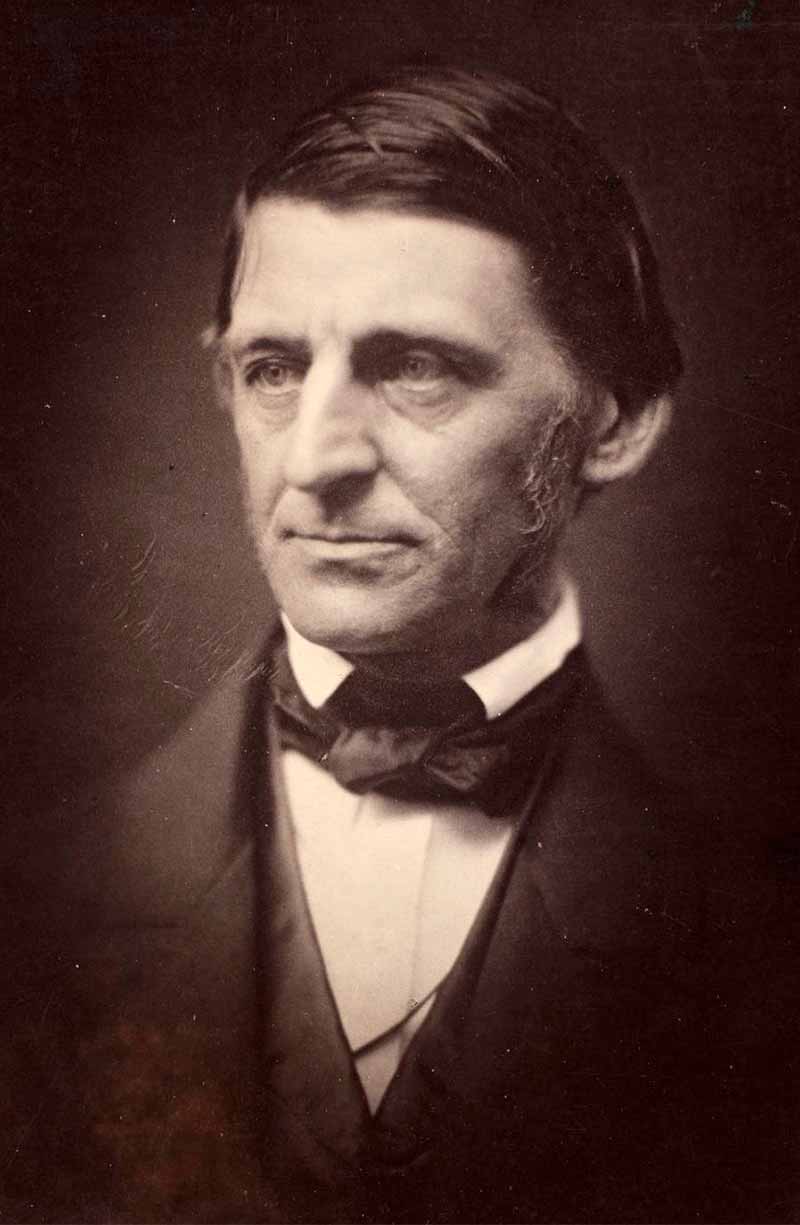
Ralph Waldo Emerson (1803-1882)
|
Like his idol, Ralph Waldo Emerson, Nietzsche’s solution to the lukewarm Christianity of his day was to transcend the belief in good and evil and make man free of all morality. He outlined his philosophy in Beyond Good and Evil, his 1885 classic read by all philosophy students. At the heart of Nietzsche’s belief was a realization of the total depravity of man, the only reality being the “Will to Power.” For him, to be beyond good and evil “is to recognize that God is dead and morality a myth.” (Rushdoony, p. 167). To the German philosopher, “Christianity was a sick neurotic pretension.” If life is beyond good and evil, and there is no truth, there is no reason to prefer life over death. Not ironically, in the last decade of the 19th century, especially in Europe, suicide became a common practice among intellectuals (but only once each).
With God dead and truth and morality mere myths, Nietzsche advocated the creation of a new elite, the ubermensch, patterned on his ideas. Supermen who had overcome the slave-morality of Christian civilization could determine for themselves a new master-morality and determine for themselves what is good. The contradictions of his philosophy and impossibility of living in a world of unreality bothered him not a bit.
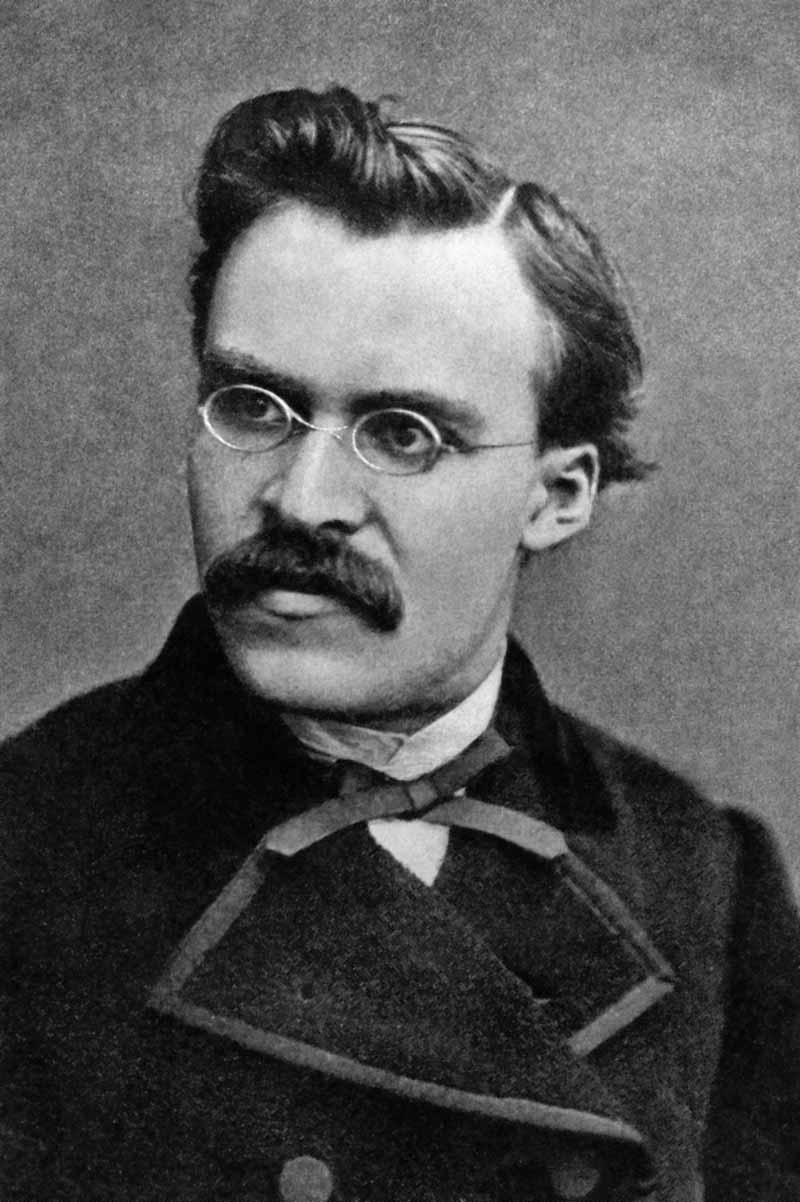
Nietzsche in 1869
Twentieth Century states would attempt to put his ideas into practice as the supermen whose warped and unnatural idealism have brought about wars and destruction of unprecedented magnitude. The historic Christian faith, for him, had produced a “false and unrealistic” morality. Mankind must realize that bad consciences were imprisoned by a biblical worldview which must be overcome by the elite supermen of the future who will free men from their false ideas. “Mankind must realize it owes nothing to a mythical God.”
“In his 1883 book Thus Spake Zarathustra, Nietzsche affirmed that all that proceeds from power is good, all that springs from weakness is bad. He expressed one aspect of that idea this way: ‘Once blasphemy against God was the greatest blasphemy, but God died and therewith also those blasphemers. To blaspheme the earth is now the deadliest sin and to rate the heart of the unknowable higher than the meaning of the earth.’”
Rushdoony observes that modern environmentalists are children of Nietzsche, “although he would have despised them as he did everyone and everything.”
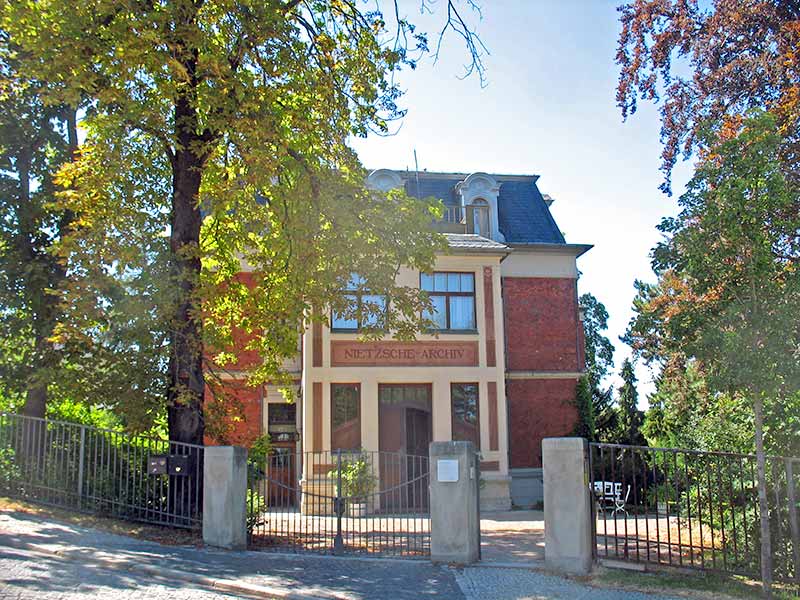
Nietzsche’s home the last three years of his life in Weimar, Germany, and the location of the Nietzsche Archives
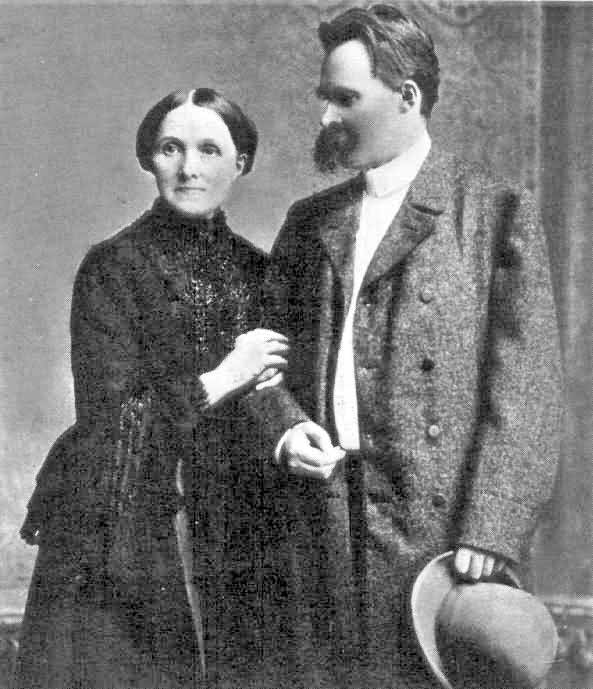
Nietzsche with his mother in 1892
|
In an autobiographical essay entitled “Ecce Homo” Nietzsche proclaimed his immortality, for he was more learned and clever than most people because he had no sense of sin. “To read Nietzsche is to realize how many moderns have borrowed his ideas! Many academicians are merely housebroken versions of Nietzsche.” He opposed the “moral channels” of life such as love and marriage and was a life-long advocate of sexual revolution. It becomes obvious he was haunted by conscience and history, for he fought so hard to erase them. You cannot erase what God has ordained. He said he was too proud to have friends and no one living was of the same rank in his world of elites, although he actually had a few good friends and probably millions of admirers. He was declared clinically insane in 1889 and committed to an asylum for his last eleven years. His sister saw to the publishing of many of his writings.
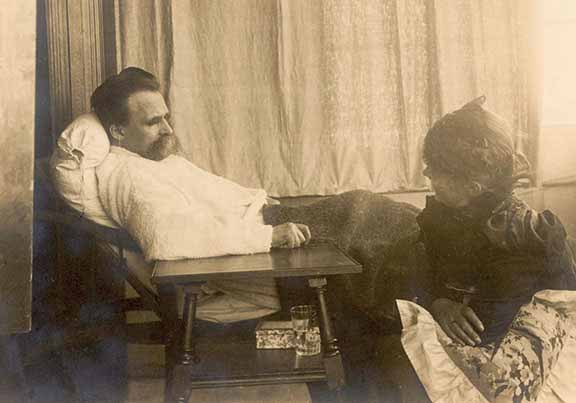
Nietzsche under the care of his sister Elisabeth during a lengthy and ultimately terminal illness
Although there are no major statues to honor his contributions to the 20th Century, as a good classicist he “helped recreate the priority of the State and the 20th Century world wars over the articles of statist faith.” (Rushdoony) His real disciples were embodied in Stalin, Hitler, Pol Pot and Chairman Mao. In his secretary’s oration at Nietzsche’s funeral he proclaimed “Holy be your name to all future generations.”
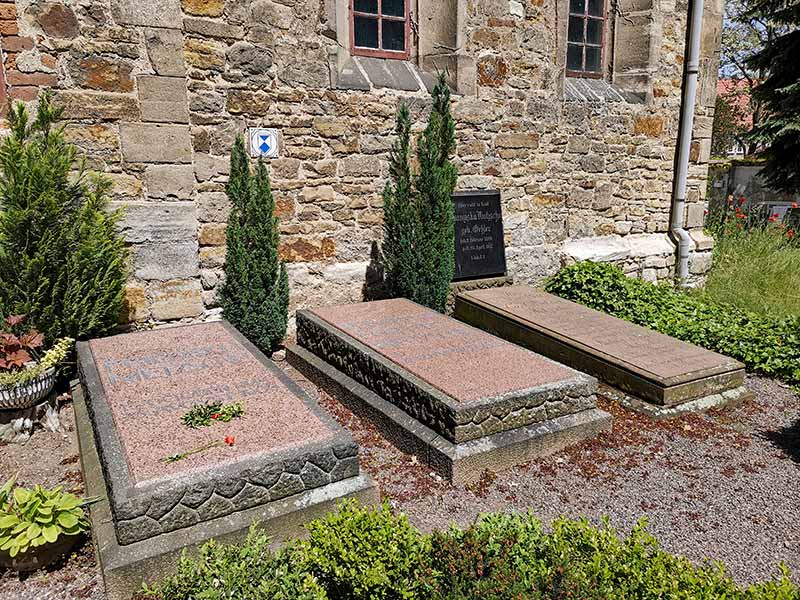
The graves of Friedrich Nietzsche (left), his father Carl (center), and mother Franziska (right)


Recommended further reading: To Be As God: A Study of Modern Thought Since the Marquis de Sade, by Rousas John Rushdoony. (2003)

Image Credits:
1 Carl Nietzsche (wikipedia.org)
2 Franziska Nietzsche (wikipedia.org)
3 Birthplace (wikipedia.org)
4 Röcken (wikipedia.org)
5 Prussian soldier (wikipedia.org)
6 University of Basel (wikipedia.org)
7 Nietzsche, 1875 (wikipedia.org)
8 Ralph Waldo Emerson (wikipedia.org)
9 Nietzsche, 1869 (wikipedia.org)
10 Nietzsche Archives (wikipedia.org)
11 Nietzsche & Mother (wikipedia.org)
12 Nietzsche & Sister Elisabeth (wikipedia.org)
13 Nietzsche Graves (wikipedia.org)
|







